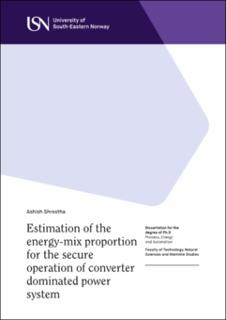| dc.contributor.author | Shrestha, Ashish | |
| dc.date.accessioned | 2024-04-08T14:00:28Z | |
| dc.date.available | 2024-04-08T14:00:28Z | |
| dc.date.issued | 2024-04-18 | |
| dc.identifier.isbn | 978-82-7206-843-0 | |
| dc.identifier.issn | 2535-5252 | |
| dc.identifier.uri | https://hdl.handle.net/11250/3125358 | |
| dc.description.abstract | The modern power system has undergone significant transformations driven by the necessary for environmental sustainability, technological progress, and evolving energy demands. A notable distinction between the modern power system and its conventional complement lies in the increased integration of renewable energy sources (RESs). This shift towards RESs, such as solar photovoltaics (PV), wind turbines, and hydropower, has significantly reduced carbon emissions and emphasized environmental sustainability. The modern power system also encompasses technological advancements in power electronic converters (PECs) and smart grid infrastructure, as well as a focus on decentralization and distributed energy resources (DERs) at the local level.
Despite these advancements, the integration of inverter-based resources (IBRs) contains challenges to grid stability, supply-demand balance, and system frequency control. One of the key challenges is the reduced system inertia caused by the high penetration of IBRs such as wind turbines and solar PV. System inertia, represented by the kinetic energy of rotating masses in conventional generators, helps maintain stable voltage levels and frequency during contingencies. However, the low inertia of PEC-based technologies limits the system's ability to withstand disturbances and maintain stable frequency. This reduced inertia and the intermittent nature of RES generation can lead to frequency fluctuations and instability in the power grid.
Furthermore, the uncertainties introduced by the stochastic nature of RES generation complicate the stability and secure operation of IBR-dominated power systems. Fluctuations in RES output, coupled with varying consumer demand, require effective balancing mechanisms to ensure a reliable power supply and avoid grid instability. Addressing these uncertainties necessitates the development of advanced control strategies and system-wide coordination mechanisms to maintain stability and security in IBR-dominated power systems.
This thesis investigates the stability and secure operation of power systems dominated by IBRs. It explores the unique dynamic characteristics and operational complexities introduced by the high penetration of RESs and reliance on PECs. The research focuses on addressing challenges related to reduced system inertia, frequency stability, and uncertainties in the demand/supply chain. It emphasizes the development of advanced modeling techniques, control algorithms, and optimization methods tailored to IBR-dominated power systems.
The research also emphasizes the significance of day-ahead and online estimation of power system parameters and time-series data analysis. Online estimation enables continuous monitoring and estimation of the energy-mix proportion, allowing operators to proactively manage the system, optimize its performance, and effectively integrate the technologies and RESs. This thesis utilizes techniques such as deep reinforcement learning (DRL) and online simulation to develop innovative strategies, control mechanisms, and optimization frameworks for the secure operation of converter-dominated power systems.
Through comprehensive studies and simulations, this PhD thesis provides valuable insights, practical strategies, and control mechanisms for enhancing the stability, reliability, and security of IBR-dominated power systems. The findings contribute to the ongoing efforts of decarbonization, renewable energy integration, and the transition to a sustainable energy future. By effectively addressing stability challenges, optimizing resource utilization, and leveraging advanced technologies, this research paves the way for a secure, reliable, and resilient power system. | en_US |
| dc.language.iso | eng | en_US |
| dc.publisher | University of South-Eastern Norway | en_US |
| dc.relation.ispartofseries | Doctoral dissertations at the University of South-Eastern Norway;186 | |
| dc.relation.haspart | Article 1: Shrestha, A., Mohammed A.M.Y., Sharma, B. & Gonzalez-Longatt, F.: A narrative review highlighting challenges and opportunities for making 100% renewable grid. Manuscript submitted to Renewable and Sustainable Energy Reviews. Not available online | en_US |
| dc.relation.haspart | Article 2: Shrestha, A. & Gonzalez-Longatt, F.: Frequency stability issues and research opportunities in converter dominated power system. Energies, 14(14), (2021), 4184. https://doi.org/10.3390/en14144184 | en_US |
| dc.relation.haspart | Article 3: Shrestha, A. & Gonzalez-Longatt, F.: Parametric sensitivity analysis of rotor angle stability indicators. Energies, 14(16), (2021), 5023. https://doi.org/10.3390/en14165023 | en_US |
| dc.relation.haspart | Article 4: Shrestha, A., Ghimire, B. & Gonzalez-Longatt, F.: Bayesian model to forecast the time series kinetic energy data for a power system. Energies, 14(11), (2021), 3299. https://doi.org/10.3390/en14113299 | en_US |
| dc.relation.haspart | Article 5: Shrestha, A., Rajbhandari, Y. & Gonzalez-Longatt, F.: Day-ahead energy-mix proportion for the secure operation of renewable energy-dominated power system. International Journal of Electrical Power & Energy Systems, 155, Part B, (2024), 109560. https://doi.org/10.1016/j.ijepes.2023.109560 | en_US |
| dc.relation.haspart | Article 6: Shrestha, A., Marahatta, A., Rajbhandari, Y. & Gonzalez-Longatt, F.: Deep reinforcement learning method in estimation of electricity-mix proportion for the secure operation of converter dominated power system. Revised manuscript submitted to Energy Reports. The published version is available at https://doi.org/10.1016/j.egyr.2024.01.008 | en_US |
| dc.rights.uri | http://creativecommons.org/licenses/by-nc-sa/4.0/deed.en | |
| dc.title | Estimation of the energy-mix proportion for the secure operation of converter dominated power system | en_US |
| dc.type | Doctoral thesis | en_US |
| dc.description.version | publishedVersion | en_US |
| dc.rights.holder | © The Author, except otherwise stated | en_US |
| dc.subject.nsi | VDP::Technology: 500::Electrotechnical disciplines: 540::Electrical power engineering: 542 | en_US |

